The Irish Farmers Journal Renewables Roadshow is now two events into its four-part series. After starting in Cork and moving to Kilkenny, the roadshow is now set to travel to Cavan and Athlone.
The aim of the roadshow is to present the facts and provide as much information as possible to help farmers, businesses, and homeowners make informed decisions. Here are some of the main takeaway messages from the events so far.
Each topic was followed up with a case study outlining investment costs, available grant aid, payback period, and estimated emission savings. This was done across three technologies: biomass heating, solar and anaerobic digestion. IrBEA’s Sean Finan explained, for example, that running a 500kW biomass boiler on a poultry farm could earn €35,000 - €45,000 per year in payments under the support scheme for renewable heat, paying for itself in 3.6 years.
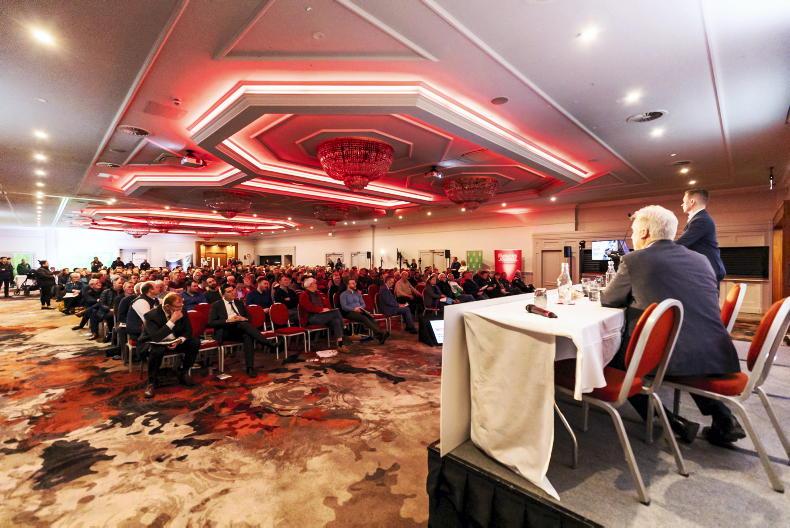
Over 400 people attended the Cork roadshow.
Solar PV case studies, provided by the IFA and Bord Gáis Energy, show that a 26.4kWp solar PV system with batteries could pay for itself in just over three years (including the TAMS grant), saving an estimated 8t CO2 per year.
Grid connections
Many farmers are facing disappointment and frustration due to the electricity grid capacity in their area. Farmers wishing to install solar PV systems on their farms are finding that they are limited in the size they can install due to weak network capacity.
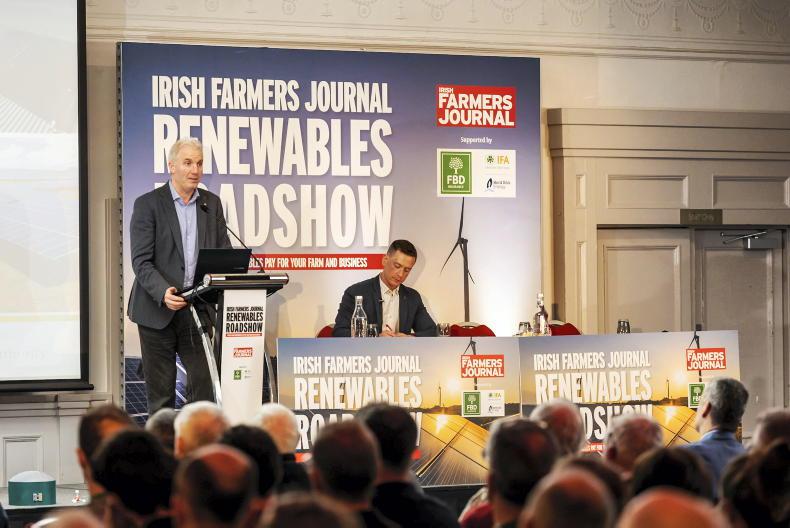
Teagasc's Barry Caslin explained how electricity grid capacity is a significant challenge in rural Ireland.
As was pointed out by Teagasc’s Barry Caslin, “It’s a disadvantage sometimes of living in a rural area that your export capacity is very limited because of the transformer capacity”.
As new schemes are announced to allow farmers to develop small-scale commercial electricity projects, the grid may not have the capacity to accommodate them all without significant strengthening works.
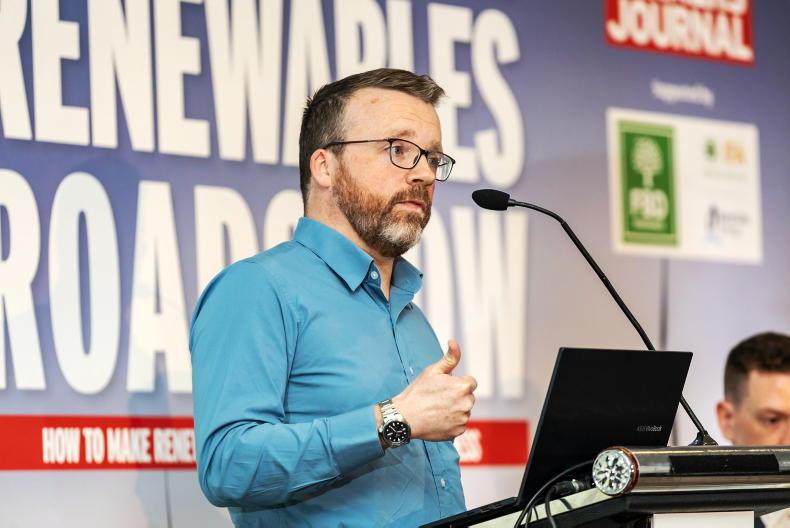
Kieran Lettice, Energy Cork gave attendees a rundown of the SEAI home energy grants at the Cork roadshow.
Farmers will likely be offered the chance to pay for the upgrade works to increase the size of renewable systems. But in many cases, this is cost-prohibitive.
Moving parts
The very real challenges that exist when trying to piece together grant aid, finance, and renewable energy systems were highlighted on the night by attendee Patricia Fouhy Barry from Cork.
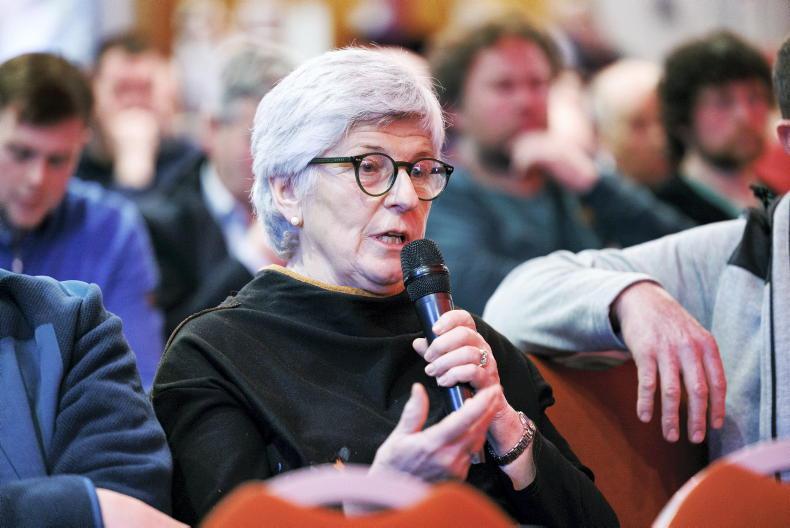
Patricia Fouhy Barry asking questions at the Irish Farmers Journal Renewables Roadshow in Cork.
Patricia rightly pointed out that there is a lot of work and moving parts involved in renewables, and it’s not straightforward. Furthermore, measures to simplify access to green finance options need to be implemented. The process needs to be more streamlined and easier to navigate if we are to accelerate the rollout of renewables on farms.
Three-phase smart meters
The delay in the rollout of three-phase smart meters stood out as one of the key challenges identified on the night. ESB plans to roll out smart meters for three-phase connections from 2025 onwards. While farmers can still export renewable electricity to the grid while on three-phase meters and get paid, instead of accurate readings of exported electricity, ESB uses an estimated deemed export quantity formula.
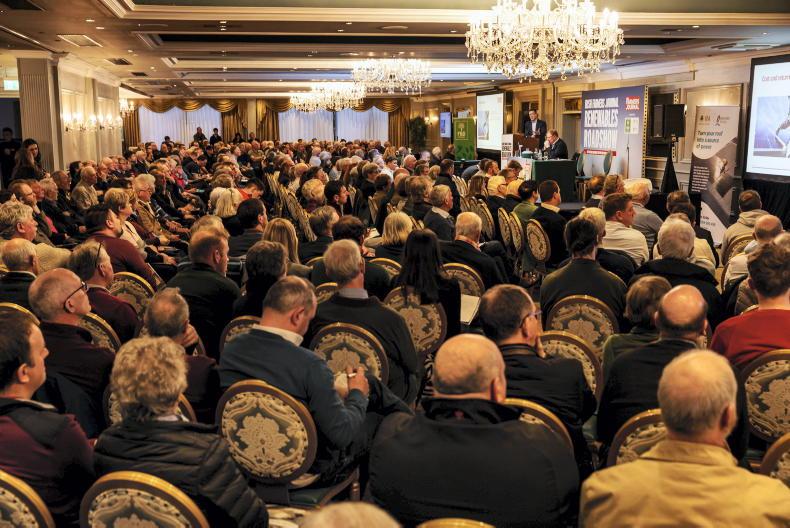
Big crowds attended the Kilkenny event.
Multiple farmers have been in touch with the Irish Farmers Journal, stating that there is a significant disparity between what has actually been exported to the grid and what they are getting paid for under this formula, with many losing out on thousands. This is a significant problem, particularly for those who use older import-export meters, readings from which are no longer accepted.
Home energy upgrades
The event also highlighted the range of grants available for home energy upgrades from the SEAI. Houses account for a quarter of all energy consumption in Ireland, and heating makes up 80% of your home energy, so improving insulation and heat retention is an important place to start. There are three avenues to do this with the SEAI: through the fully funded energy upgrade, the one-stop shop service or individual energy upgrades. SEAI grants can also be availed of if you are undertaking a property renovation under the Vacant Property Refurbishment Grant.
How to attend
The Irish Farmers Journal Renewables Roadshow is set to continue its tour and the remaining events will take place on:
23 April at the Errigal Country House Hotel, Cavan;
30 April at the Athlone Springs Hotel, Athone.
The roadshows are free-to-attend evening events with doors open from 6.30pm. The session kicks off at 7.30pm sharp and will run until 10pm. Tea, coffee and sandwiches will be served.
To register, simply open your camera and scan the QR code to access the registration link or go to www.ifj.ie/renewables.
SCAN THE CODE

The roadshow is being delivered in partnership with FBD, the Irish Farmers Association and Bord Gáis Energy.
The Irish Farmers Journal Renewables Roadshow is now two events into its four-part series. After starting in Cork and moving to Kilkenny, the roadshow is now set to travel to Cavan and Athlone.
The aim of the roadshow is to present the facts and provide as much information as possible to help farmers, businesses, and homeowners make informed decisions. Here are some of the main takeaway messages from the events so far.
Each topic was followed up with a case study outlining investment costs, available grant aid, payback period, and estimated emission savings. This was done across three technologies: biomass heating, solar and anaerobic digestion. IrBEA’s Sean Finan explained, for example, that running a 500kW biomass boiler on a poultry farm could earn €35,000 - €45,000 per year in payments under the support scheme for renewable heat, paying for itself in 3.6 years.

Over 400 people attended the Cork roadshow.
Solar PV case studies, provided by the IFA and Bord Gáis Energy, show that a 26.4kWp solar PV system with batteries could pay for itself in just over three years (including the TAMS grant), saving an estimated 8t CO2 per year.
Grid connections
Many farmers are facing disappointment and frustration due to the electricity grid capacity in their area. Farmers wishing to install solar PV systems on their farms are finding that they are limited in the size they can install due to weak network capacity.

Teagasc's Barry Caslin explained how electricity grid capacity is a significant challenge in rural Ireland.
As was pointed out by Teagasc’s Barry Caslin, “It’s a disadvantage sometimes of living in a rural area that your export capacity is very limited because of the transformer capacity”.
As new schemes are announced to allow farmers to develop small-scale commercial electricity projects, the grid may not have the capacity to accommodate them all without significant strengthening works.

Kieran Lettice, Energy Cork gave attendees a rundown of the SEAI home energy grants at the Cork roadshow.
Farmers will likely be offered the chance to pay for the upgrade works to increase the size of renewable systems. But in many cases, this is cost-prohibitive.
Moving parts
The very real challenges that exist when trying to piece together grant aid, finance, and renewable energy systems were highlighted on the night by attendee Patricia Fouhy Barry from Cork.

Patricia Fouhy Barry asking questions at the Irish Farmers Journal Renewables Roadshow in Cork.
Patricia rightly pointed out that there is a lot of work and moving parts involved in renewables, and it’s not straightforward. Furthermore, measures to simplify access to green finance options need to be implemented. The process needs to be more streamlined and easier to navigate if we are to accelerate the rollout of renewables on farms.
Three-phase smart meters
The delay in the rollout of three-phase smart meters stood out as one of the key challenges identified on the night. ESB plans to roll out smart meters for three-phase connections from 2025 onwards. While farmers can still export renewable electricity to the grid while on three-phase meters and get paid, instead of accurate readings of exported electricity, ESB uses an estimated deemed export quantity formula.

Big crowds attended the Kilkenny event.
Multiple farmers have been in touch with the Irish Farmers Journal, stating that there is a significant disparity between what has actually been exported to the grid and what they are getting paid for under this formula, with many losing out on thousands. This is a significant problem, particularly for those who use older import-export meters, readings from which are no longer accepted.
Home energy upgrades
The event also highlighted the range of grants available for home energy upgrades from the SEAI. Houses account for a quarter of all energy consumption in Ireland, and heating makes up 80% of your home energy, so improving insulation and heat retention is an important place to start. There are three avenues to do this with the SEAI: through the fully funded energy upgrade, the one-stop shop service or individual energy upgrades. SEAI grants can also be availed of if you are undertaking a property renovation under the Vacant Property Refurbishment Grant.
How to attend
The Irish Farmers Journal Renewables Roadshow is set to continue its tour and the remaining events will take place on:
23 April at the Errigal Country House Hotel, Cavan;
30 April at the Athlone Springs Hotel, Athone.
The roadshows are free-to-attend evening events with doors open from 6.30pm. The session kicks off at 7.30pm sharp and will run until 10pm. Tea, coffee and sandwiches will be served.
To register, simply open your camera and scan the QR code to access the registration link or go to www.ifj.ie/renewables.
SCAN THE CODE

The roadshow is being delivered in partnership with FBD, the Irish Farmers Association and Bord Gáis Energy.












 This is a subscriber-only article
This is a subscriber-only article











SHARING OPTIONS: